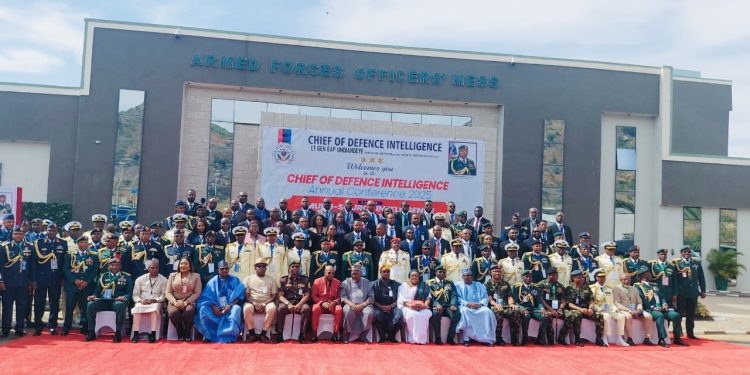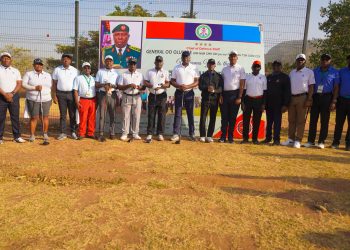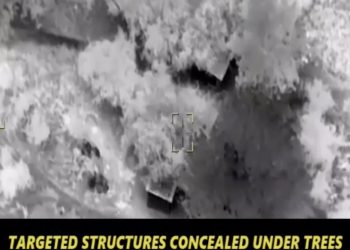By Nkechi Eze
Against the backdrop of Nigeria’s increasingly complex national security environment defined by hybrid warfare, digital-age threats and the urgent need for intelligence integration, the nation’s defence and intelligence community converged in Abuja on Monday for the opening of the Chief of Defence Intelligence Annual Conference 2025. The conference, now regarded as one of the most strategic gatherings in Nigeria’s security calendar, brings together Defence Advisers and Attachés from across the world, alongside Directors of Regional and State Intelligence Offices, to review operational experiences, strengthen interagency synergy and deepen discussions on intelligence modernisation. With security challenges across West Africa growing more unpredictable, this year’s conference arrives at what officials described as a “critical turning point” for national security. The Defence Intelligence Agency (DIA) in recent years has undertaken far-reaching reforms, including the expansion of cyber intelligence capabilities, digitisation of intelligence processes and gradual integration of artificial intelligence into operations. The theme for 2025, “The Role of Multi-Source Intelligence Innovation in National Security,” underscores the country’s commitment to a resilient, technology-driven intelligence architecture capable of anticipating and countering threats “before they take shape.”
The opening ceremony featured major addresses from legislative, executive and intelligence leaders. Delivering the message of the Senate President, His Excellency Sen. Godswill Akpabio, the Chairman of the Senate Committee on Defence, Sen. Ahmad Lawan, described the theme as “both relevant and urgent,” reflecting global shifts in intelligence operations. “Around the world, nations are relying on multi-source, technology-enabled intelligence systems to guide security decision-making,” he said, commending the DIA for efforts in data integration, interagency collaboration and technological adaptation. According to him, “as threats evolve, our capacity to collect, process and interpret information in real time must evolve even faster.” He praised the Agency’s openness to emerging technologies “from artificial intelligence to machine learning and advanced analytics” and highlighted the growing importance of defence diplomacy. He stressed that Defence Attachés remain “critical envoys of Nigeria’s strategic interests abroad,” while State Office Coordinators “anchor the nation’s ground-level intelligence backbone.” He called for deeper international cooperation in capacity building, intelligence sharing and acquisition of surveillance systems, expressing confidence that the conference would “provide the strategic direction needed to reinforce national and regional security frameworks,” before declaring the event open.
The Honourable Minister of Defence, His Excellency Mohammed Badaru Abubakar, CON, also addressed the gathering and conveyed the goodwill of the President and Commander-in-Chief. He described the DIA as “the ears and eyes of the nation,” praising its personnel for their contributions to national defence. Warning of fast-evolving threats, he said: “Our adversaries are no longer bound by terrain or conventional patterns. They exploit technology, hide in civilian spaces and operate in both physical and digital worlds at frightening speed.” He emphasised that superiority in today’s security environment “is not defined by numbers but by the speed, depth and precision of actionable intelligence.” Commending the implementation of the Joint Intelligence Mission Data and Analytics System (JIMDAS), he noted that advanced systems are essential, but “technology is only as effective as the human beings behind it.” He assured participants that the Ministry remains committed to training analysts, cyber operators and field officers. The Minister stressed the importance of regional partnerships, saying, “Threats coordinate across borders; therefore, our responses must be even more coordinated.” He urged participants to challenge conventional assumptions and “bring bold, practical ideas that translate into real operational improvements.”
In his welcome address, the Chief of Defence Intelligence, Lt.-Gen. Emmanuel Undiandeye, expressed deep appreciation to participants, describing the annual conference as “a vital pillar in the Agency’s operational and strategic calendar.” He explained that the theme was chosen in response to evolving national and regional realities and reaffirmed that the Agency remains intentional about harnessing innovation, technology and human intelligence for national security. Paying solemn tribute to fallen personnel, he said: “Their sacrifice is the foundation of our peace and sovereignty. We honour them by improving the system they defended.” He acknowledged that despite the persistence of insurgency, terrorism, banditry and organised crime, the collective efforts of security forces, supported by improved intelligence coordination have significantly degraded adversarial networks. However, he warned that the fluid nature of threats demands continuous innovation. “Multi-source intelligence is no longer optional; it is the backbone of modern national security,” he said, noting that Nigeria must leverage human, signals, open-source, imagery, cyber, military, economic and socio-political intelligence to achieve decisive advantage.
Lt.-Gen. Undiandeye also announced the commencement of work on the Defence Intelligence Agency Technology Centre (DIATC), first introduced at the previous conference. He described the centre as “a game-changing capability for the nation,” focused on cyber security, artificial intelligence, robotics, machine learning and data analytics. The facility, he said, will enhance the nation’s ability to “penetrate adversary networks, access the deep and dark web, track terrorists and criminals and support targeted intelligence operations.” He added that the DIATC will serve as a central hub for real-time data collection, analysis and dissemination, while supporting paramilitary and civilian intelligence sources. He emphasised that national security “cannot be achieved in isolation,” calling for stronger interagency and regional cooperation.















